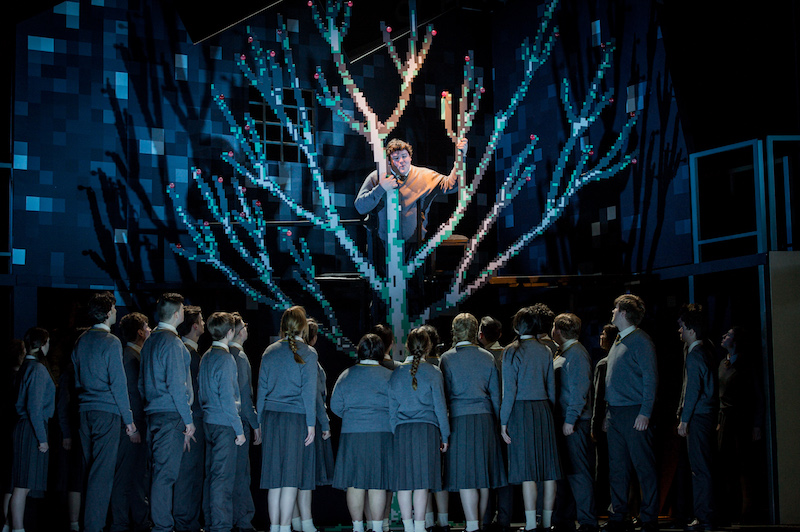A youth opera about adolescent alienation? We’ve watched too many of them founder in their own plodding worthiness, and the heart sank at the prospect of yet another, particularly one travelling under the determinedly downbeat title, Nothing. But this was Glyndebourne, whose education department has always been the brand-leader for youth opera. And the composer-librettist team sounded hopeful: two years ago, with entrancing designs and a score dominated by marimbas and strings, David Bruce and Glyn Maxwell’s The Firework-Maker’s Daughter showed what airy magic could be conjured up in the service of an opera for young people.
The libretto is based on Janne Teller’s novel of the same name, and the plot has an ingenious logic. A teenage class assembles for the autumn term, but one boy suddenly declares that ‘nothing matters’, stalks out, and goes to sit in a tree. Attempts to talk him down from his angry isolation take the form of ever more savage dares to immolate whatever each person deems most precious to them, until – still proclaiming his nihilism – the boy is goaded into defiantly and shockingly immolating himself.
 Nothing, Glyndebourne – photo credit: Robert Workman
Nothing, Glyndebourne – photo credit: Robert Workman
Bruce says he was intrigued by the challenge of this story because of what it didn’t say, with the central question still left hovering after the drama had been played out. Director Bijan Sheibani was attracted by the story’s web of emotional conflicts, ethical dilemmas, and philosophical ideas, and librettist Glyn Maxwell created a script which was admirably direct. And from the moment the curtain rises on this classroom and its very ordinary denizens, we are plunged into an entirely believable world.
Tonal and easy on the ear, the score is as spare and economical as the libretto, and as the work progresses we get pleasing (but not plagiaristic) echoes of Peter Grimes (harp over low winds, spiralling dissonances on flutes), of The Rake’s Progress (perky wrong-note accompaniments), and West Side Story (jagged male and female choruses in hurtling opposition). Meanwhile the writing for the rebel Pierre – persuasively sung by tenor Stuart Jackson – is exquisite, establishing a positively Elizabethan sound with its graceful harp accompaniment. In this fertile atmosphere, with the force of Giles Cadle’s designs intensified by Paule Constable’s crepuscular lighting, the ideological conflict at the heart of the work comes across with chilling intensity.
And chilling is indeed the word as the plot moves into Lord of the Flies territory, with everyone drawn fearfully but helplessly into the communal madness. ‘Where were the parents?’ is the recurring refrain, as normally civilised behaviour is sacrificed to a herd mentality. The orchestra is a blend of young amateurs and players from the Southbank Sinfonia, while the singers are local teenagers beefed up by five young professionals: the singing and acting is stunningly professional, with the numerous step-out solos for members of the chorus taken with total confidence; Sian Edwards is the inspiring presence on the podium. Plaudits, therefore, to baritone Tristan Hambleton, countertenor James Hall, mezzo Marta Fontanals-Simmons, and soprano Robyn Allegra Parton as the professionals incarnating the protagonists, and to Dominic Rawson, Louise Mosley, and George Reynolds – all soloists from Glyndebourne Youth Opera – for leading the teenage pack.
As the characters finally reassemble, now grown-up, to sing a lament for the excesses of their childhood – and for the friend they lost – one realises what huge echoes are left in the mind by this brilliant production of a profoundly original work. The Royal Opera House, as co-producers, should ensure that it is much more widely seen.